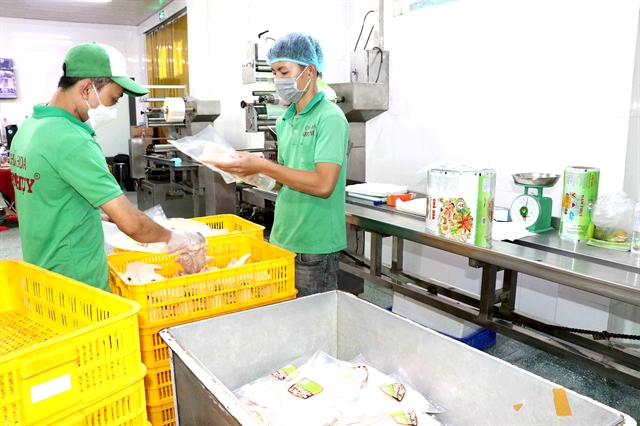 Economy
Economy

 |
| A business household in Thanh Hóa Province. About 2 million business households still implement lump-sum tax payments. — VNA/VNS Photo |
HÀ NỘI — Starting June 1, business households with large annual revenues will be required to transition from lump-sum tax payments to tax payments based on actual revenue, as mandated by Decree 70/2025/NĐ-CP.
This shift marks a significant step in the Government's ongoing efforts to modernise tax management and ensure greater fairness and transparency in tax obligations.
Under the new regulation, business households earning over VNĐ1 billion per year in six specific sectors must issue e-invoices generated from cash registers connected to tax authorities. This replaces the existing lump-sum tax model, which is considered outdated and prone to inaccuracies.
Data from the General Statistics Office shows that, as of the end of 2024, there were 3.6 million business households under tax administration, contributing nearly VNĐ26 trillion to the State budget. However, about 2 million of these still pay taxes using the lump-sum method, with an average monthly payment of just VNĐ700,000 as of early 2025.
This method has been considered misaligned with actual business performance. In many cases, businesses with significantly different revenues end up paying similar tax amounts.
Lê Minh Tâm, a textile business owner in HCM City, said e-invoices would more accurately reflect actual revenue, resulting in fairer tax calculations.
The policy has also received a generally positive response from business owners in traditional markets like Phú Nhuận and Tân Định in HCM City, as well as from online entrepreneurs. Many agree that transitioning to tax payments based on actual revenue is a necessary step toward transparency and modernisation.
Diệp Minh Sơn, owner of an online shop selling seafood on TikTok, noted that the new system might be more challenging for cash-based businesses, but less so for those, like his shop, already operating on a digital platform.
Many business households lack the technological knowledge and skills required to use electronic cash registers or maintain accounting records. The inability to store and track purchase invoices also complicates accurate tax reporting.
Recognising these difficulties, tax authorities are rolling out support initiatives to help business households adapt.
Nguyễn Văn Được, general director of Trọng Tín Accounting and Tax Consulting Co Ltd, urged the large business households not to panic.
"They do not have to fully comply like large enterprises. It is simpler than they assume, just issuing invoices and keeping basic accounting records," he said.
According to Được, under the new system, taxes are proportionate to incomes, so high-revenue households will pay more, while smaller ones will pay less, reflecting the true spirit of tax equity.
Still, he acknowledged that the switch could increase compliance costs due to the need for bookkeeping and administrative tasks.
To help business households and individuals determine their revenue, expenses and tax obligations according to each sector, while gradually implementing tax payments based on the declaration method, digital technology is considered an essential solution.
Currently, tax authorities are actively promoting awareness campaigns, mobilising and supporting business households and individuals in transitioning to the new tax management system.
According to tax expert Nguyễn Ngọc Tú from the Hà Nội University of Business and Technology, the management agencies need to make it easier for business households to comply with regulations by providing simple forms of invoices and documents.
It is crucial to avoid confusing business households, as this could lead to delays in compliance or inconsistent practices across households.
Tú recommended setting specific targets, such as requiring a set percentage of households to switch to the new system by the end of 2025, and gradually increasing that percentage into 2026. — BIZHUB/VNS

.jpg)


